The Japan Buddhist Federation Participated in World Economic Forum 2014 in Davos
The Japan Buddhist Federation Participated in
World Economic Forum 2014 in Davos
Rev. Daiko Matsuyama
On January 21-25, 2014, the JBF Vice-President Kokei Kitakawara (Chief Abbot of Todaiji Temple of Kegon Shu denomination) participated as the delegate from the JBF in the World Economic Forum 2014 in Davos. It was the second time the JBF participated in the Davos Meeting (In 2010, the then-President Most Ven. Yukei Matsunaga, the Chief Abbot of Koyasan Shingon Shu Denomination, participated). I participated as interpreter for Rev. Kitakawara.
With the theme “Reshaping the World”, politicians, economists, scholars, artists and religious leaders from all over the world gathered in Davos to discuss and exchange ideas on various issues. There were about 2000 leading figures of the world such as Hassan Rouhani, the President of Iran, the U.K. Prime Minister David Cameron, as well as Israel’s Prime Minister Benjamin Netanyahu. From Japan, there were about 100 participants, including Prime Minister Shinzo Abe and Haruhiko Kuroda, the Governor of the Bank of Japan.
Participated Programs and Sessions
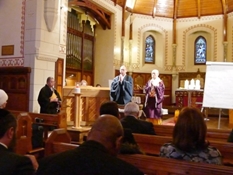
Session hosted by Church of England
Jan. 21 Reception for the Sochi Olympics (hosted by the Government of Russia)
Jan. 22: How to Stop the Torture (hosted by Church of England)
Rev. Kitakawara and I arrived late in the evening of Jan. 21. Therefore the first full-day of participation began on the following day. We participated in the session hosted by the Church of England. Delegates of Christianity, Islam, Hinduism, Judaism, and Buddhism offered messages and prayers to stop torture.
Jan. 22 Keynote Speech by Prime Minister Shinzo Abe
In the afternoon, Rev. Kitakawara and I went to listen to a keynote speech by Prime Minister Shinzo Abe. It was the first time for a Japanese Prime Minister to deliver a Keynote Speech. All seats were filled, and Iran’s President Hassan Rouhani’s presence gave this writer an impression that the degree of attention was high for this speech.
Prime Minister Abe delivered the speech in English even with a couple of jokes to warm up. After his speech, Dr. Schwab asked a question on his visit to the Yasukuni Shrine. In his speech, the Prime Minister touched on issues the country is facing as well as goals he sets so high, it would require determination and action from the people of Japan in order to achieve. In my recollection, the preceding Prime Ministers of Japan addressed what he can promise and be certain to achieve. Prime Minister Abe’s keynote speech, however, seemed to address what they strive to achieve, and it gave the impression that the content and the style of speech by Japanese Prime Ministers might be changing through time.
Jan. 23 Africa-Japan Roundtable Breakfast
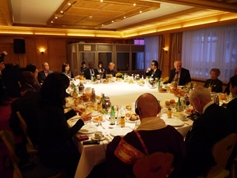
Africa-Japan Roundtable Breakfast
With the main presence of Ms. Sadako Ogata who served as the United Nations High Commissioner for Refugees, the Africa-Japan Roundtable Breakfast was held on the 23rd.
The participants included the President of Ghana, Rwanda’s Minister of Finance, as well as VIPs from both Africa and Japan. We were able to discuss Japan’s contribution to Africa and how the support from Japan ought to be in the future. It is worth noting that the long-term / long-distance support of Japan has been highly valued by Africa, and that even in Africa the women’s social advancement is crucial both economically and socially. As Japan’s support to Africa does not get covered very much in the news, this writer found it refreshing to know that it is well recognized among the people in Africa.
Jan. 23 Japan Night
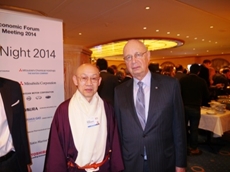
VP Kitakawara and Dr. Schwab
Outside the sessions, WEF meeting provides opportunities of exchange among the participants. Between sessions, VP Kitakawara and I met and had informal talks with Dr. Klaus Schwab, the executive chairperson of the World Economic Forum, and Joichi Ito, the first Japanese executive director of MIT Media Lab and many other leading figures. Among the receptions held by different countries, Japan Night and Japan Lunch seemed most popular, largely because Japanese cuisine such as sushi is highly rated today. Over 600 people came to Japan Night and Japan Lunch and enjoyed Japanese food. Food is a medium that can transcend social and professional positions / affiliations to unite us as humans, and evidently there shines the potential of Japan.
Bilateral Meeting
One other important impression I had during the Davos Meeting was that there is a sense of great expectation toward Buddhism from people of the world , and it comes not necessarily from the leaders of today but from the people in their 20’s and 30’s.
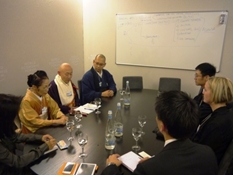
Bilateral Meeting with young leaders
At the Davos Meeting, there are Open Sessions which are open to every registered participant, and Private Sessions which are invitation only. There are also bilateral meetings for those who want to meet and discuss with a specific person privately.
VP Kitakawara received bilateral meeting requests from people of different countries. Though time was limited in his schedule, the VP had bilateral meetings with people from England, China, New Zealand, and Singapore. One of them was a director of an NPO working in international battlefields. Another one worked in Chinese government. Another was a philosophy professor at Oxford University. While they all come from different walks of life, interestingly they all are in their 20’s and 30’s.
“How can the teachings of the Buddha be applied to business in a world soiled by greed of the capitalistic economy?”, “How can people reconcile with each other after being divided as enemies by war?”, “Isn’t religious / cultural exchange most important in order to dissolve regional conflicts seen between China and Japan for example?” To every question, VP Kitakawara answered with much sincerity.
The most memorable talk came from a question on how China-Japan relations could be improved. In response to the question, VP Kitakawara began telling a story about the Chinese Buddhist Master Jian Zhen.
“1300 years ago, Buddhism was already introduced to Japan, but there was no precept and no institution to ordain priests. Master Jian Zhen was asked to send his disciples who can ordain monks to Japan. As his disciples were hesitant to undertake the dangerous sea travel to Japan, the Master decided to do it himself. After 5 unsuccessful attempts and in spite of becoming blind, he finally made it to Japan. Master Jian Zhen was indeed a pioneer of China-Japan exchange.
1300 years later, I visited China. Secretary of the communist party in Yangzhou heard that Jian Zhen was from Yangzhou and asked for the statue of the Master, enshrined in Todaiji-Temple, to be lent for the Shanghai Expo 2010 exhibition. Just then, the issues of the Senkaku Islands untimely fueled an anti-Japan movement, and the plan was cancelled. However, the government of Yangzhou felt strongly about welcoming the Master back to his home. The homecoming of the Master Jian Zhen was ultimately implemented successfully. I had the honor of accompanying the Master’s homecoming. A huge crowd gathered for the homecoming in Yangzhou, and it was broadcast nationwide via satellite.
The relationship between China and Japan has been cultivated for 2000 years. Master Jian Zhen’s meritorious deed made 1300 years ago still contributes to the friendship of the two countries. In comparison, the China/ Japan issues symbolized by the Senkaku Islands has emerged within the last 50 to 100 years. It is crucial for us to build the relationship today with a long-term perspective. “
This story certainly made an impression on everyone listening in the room. As an interpreter for VP Kitakawara, I had the honor of listening to him side by side throughout the proceedings in Davos, and feel that his story, of all the stories and speeches, made the biggest impression on the many listeners.
One of the delegates said to VP Kitakawara, “Every time politicians and scholars of the two countries get together, it never leads to a positive discussion. Instead, it always leads to a debate on the differences in interpretation and accusations of each other’s remarks.”
A young leader who works in the Chinese government said to VP Kitakawara, “Today, China is covered with super capitalism. Unfortunately, religions and morals have been disrupted completely by the Great Cultural Revolution, and we only have the market to believe in. Now that the period of rapid growth is coming to an end, there are young people, though not many, who want to take back what they have lost and find some spiritual guidance. I am a Buddhist myself, so whether it’s a business world or a political world, I would like to lead the people of China in the right direction with the teachings of Buddha.”
Note from the Writer:
Being able to meet leading figures of the world was truly encouraging. While there are a number of tough issues, my hopes for our generation is very high, and my view of the future is not necessarily bad at all. I will continue to endeavor with this valuable experience in Davos.
Our mission during the Davos Meeting was to share the wisdom of Buddha’s teachings in search of ways to contribute the power of faith and religions for peace and prosperity of the world in the frame of politics and economics where discussions tend to become short term and narrow-versioned.
Lastly, I would like to extend my sincere gratitude to the Japan Buddhist Federation for giving me this extraordinary opportunity.
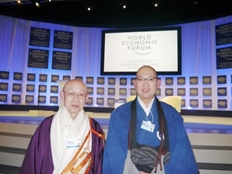
Rev. Daiko Matsuyama
Member of the JBF International Exchange Committee
Deputy Chief Priest of Daiko-in Temple
Rinzai Shu Denomination, Myoshin-ji School

 寺務サポート
寺務サポート
 一般の方へ
一般の方へ